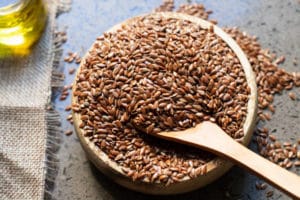
Flaxseed, a little treasure
Flaxseed, that little golden or brown treasure, is much more than just a culinary ingredient. Cultivated for thousands of years, this seed with its many virtues has stood the test of time to become a superfood recognised by the scientific community. Let's discover its fascinating history and its many health benefits.
A history dating back to the dawn of civilisation
The history of flax (Linum usitatissimum) began over 10,000 years ago in the Fertile Crescent, a region stretching from Egypt to Mesopotamia. The first traces of its cultivation date back to around 8,000 BC, making flax one of the oldest plants cultivated by man.
In ancient Egypt, flax was considered a gift from the gods. The Egyptians used it not only for its textile fibres, which were used to make the clothes of the pharaohs and the mummies' bandages, but also for its seeds, which had medicinal properties. Medical texts of the time already mention the use of linseed to treat various ailments.
In the Middle Ages, Charlemagne ordered the cultivation of flax throughout his empire, recognising its importance for both its fibres and its seeds. Herbalist monks of the time commonly used flaxseed in their medicinal preparations.
Exceptional nutritional composition

Nutritional composition of flaxseed
Flaxseed owes its reputation as a superfood to its remarkable nutritional profile:
Essential fatty acids
Flaxseed is particularly rich in omega-3s, especially alpha-linolenic acid (ALA). They contain around 23 grams of ALA per 100 grams, making them the most concentrated plant source of omega-3.
Dietary fibre
With around 28 grams of fibre per 100 grams, flaxseed is an excellent source of soluble and insoluble fibre. These fibres play a crucial role in digestive health and blood sugar control.
Plant proteins
Containing around 20% of protein, linseed is an interesting source of vegetable protein, particularly for vegetarians and vegans.
Lignanes
Flaxseed is the richest food source of lignans, phytochemical compounds with powerful antioxidant properties.
Scientifically proven health benefits
Cardiovascular health
Scientific studies have shown that regular consumption of flaxseed helps to :
- Reduce total and 'bad' (LDL) cholesterol levels
- Reduce blood pressure
- Prevent the formation of blood clots thanks to their anti-inflammatory properties
Digestive health
The fibre contained in flaxseed helps :
- Better intestinal regularity
- Developing a balanced intestinal flora
- Preventing constipation
- A feeling of prolonged satiety
Hormonal regulation
The lignans present in flaxseed have phytoestrogenic properties that can :
- Helps regulate the menstrual cycle
- Relieving menopausal symptoms
- Help maintain optimal bone density
Anti-inflammatory properties
Flaxseed's high omega-3 and antioxidant content gives it anti-inflammatory properties that can help :
- Reducing chronic inflammation
- Relieve the symptoms of arthritis
- Improving skin health
How to include flaxseed in your diet
To reap the full benefits of flaxseed, we recommend that you eat it ground, as the husk of whole seeds is difficult to digest. Here are a few suggestions:
- In smoothies and yoghurts

Flaxseed smoothie
- Sprinkled over salads
- Incorporated into bread or cake doughs
- Mixed with breakfast cereals
- As a partial replacement for flour in recipes
The recommended dose is 1 to 2 tablespoons a day (10-20g).
Precautions for use
Despite their many benefits, there are a few precautions to be taken:
- Begin consumption gradually to avoid digestive problems
- Drink enough water because of their high fibre content
- Keep ground seeds refrigerated to prevent rancidity.
- Consult a health professional if you are taking medication, as flaxseed may interact with certain medicines.
Conclusion
Flaxseed, a real concentrate of nutrients, fully deserves its place in a balanced diet. Their age-old history and scientifically-proven benefits make them the food of choice for those who want to look after their health naturally. Easy to incorporate into your daily diet, they are an accessible and economical nutritional supplement for improving your general well-being.
Whether for their anti-inflammatory properties, their cardiovascular benefits or their action on digestive health, flaxseed has demonstrated its effectiveness through numerous scientific studies. By following the recommendations for consumption and observing the precautions for use, everyone can benefit from the virtues of this ancestral superfood.